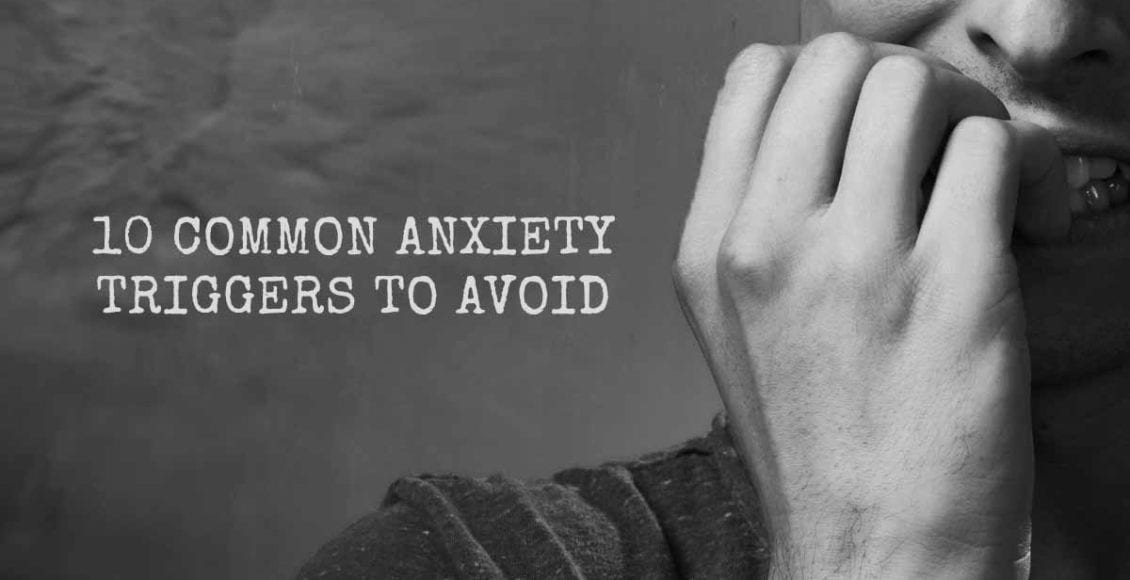There are a number of reasons why anxiety attacks occur, and if you have issues with anxiety, you might want to take a look at these common anxiety triggers:
1. Losing your way
People who have a specific “vision” for how their life is going to go and then experience, either realistically or perceptibly, a loss of that vision, may feel some anxiety around this occurrence. When all of a person’s hopes and dreams come crashing down around them, even if it isn’t actually happening, they may experience a heightened sense of anxiety. As is so often the case, a good remedy for anxiety is deep belly breathing and mindful meditation. If you feel further help is needed, a consultation with a therapist, counselor or psychiatrist is likely in order. Often, though, meditation becomes almost like an outlet for anxiety to be swept away…in as little as ten dedicated minutes every day.
2. Improper stress management
For me, at least, I know that if I don’t manage my stress appropriately it OWNS me. Stress makes feelings of anxiety and fear worse by blowing them up, and anyone with anxiety would do well to make stress management one of their top priorities.
3. Negative thoughts
Negative thoughts breed negative behaviors and continue to spread like a vile contagion to the societal level. Find yourself hanging around negative people? It might be because you’re one of them…and this may be a substantial reason for the anxiety in your life. The way to break out of this spiral of negativity is to do its opposite: do only positive things in your life. Find a new crowd to hang out with who doesn’t bring you down. Start a new hobby, or get back into one that’s perhaps fallen away. For me personally, when I am asked what I do to reduce stress I have a laundry list: taking care of my pet, gardening, baking, reading, cycling, rock climbing…all activities I do regularly, and which bring me great joy. Exercise is possibly one of the best thought: even a ten-minute walk can boost your endorphins significantly, helping your anxiety melt away.
4. Sleep deprivation
Did you know that driving a car after being awake for just 18 hours places you in the same statistical range of getting into an accident as does the amount of alcohol that would get you a DUI? Lack of sleep leads to a number of problems, all of which are exacerbated by anxiety, which is produced by lack of sleep…it’s basically a vicious cycle. Check with your doctor to see if you have a sleep disorder if you think this may be a problem for you.
5. Low blood sugar
My climbing partner, who is a geneticist, commented to me recently when I was rummaging in my bag for something to munch on, that if brain glucose levels drop below 25% of what your brain needs, you’ll die. A rather macabre comment for the moment -we were rock climbing in an absolutely beautiful canyon- but to extrapolate: brains need sugar to function. Not having enough sugar, while it may not kill you, will make you irritable, easily frustrated and increase your anxiety levels by stressing out your brain. Consult a doctor if you think you might have blood sugar level problems, often marked by dizziness, abrupt mood swings, and shakiness.
6. Overworking
Our determination to push ourselves always harder, do better, get more, etc. is an anxiety magnet. Overworking creates stress, and stress creates anxiety. It really is that simple.Try practicing a little mindfulness, meditation and gratitude to relieve that anxiety.
7. Some sensory inputs
Loud sounds can often trigger the brain’s amygdala to issue a fight-or-flight response. Lights and smells can trigger emotional responses as well, and these all heighten the brain’s stress levels, and therefore your anxiety levels. Simply understanding this is enough to help ward off anxiety: if you understand that your environment may contain “triggers” you’re better off managing your responses to them.
8. Behaving anti-socially
Everyone has varying levels of what they need socially, and people must bear in mind that when considering whether someone is behaving anti-socially. People who a normally social and then drop out of their usual crowds are usually behaving anti-socially and may be risking an anxiety attack; introverts who rarely socialize run the risk of becoming too isolated, and that also creating a perfect environment for an attack. Fortunately, the antidote is simple: call some friends to get together just because, go on a coffee date with your best bud, or hit a concert with some friends.
9. Inadequate nutrition
We tend to think that our diets are probably pretty good but actually, if you’re following the typical “Western diet” chock-full of processed foods, you’re actually pretty nutritionally lacking…in fact, studies have shown that people eating traditional diets, like Mediterranean or Japanese or whatever, have 25-35% lower levels of mental illness than those eating Western diets. If you think you may be eating poorly, we suggest that you ask your doctor for a recommendation to a nutritionist.
10. Drinking alcoholic beverages
The idea is that putting a depressant -alcohol- into your system to combat anxiety should work, right? And it often does, though quite temporarily. Alcohol is a wily chemical in the human body and the “rebound” part of it -the same part that makes you wake up in the middle of the night with sweaty sheets and a pounding heart- actually just creates more triggers for anxiety. You can see how easily this cycle progresses, right? So we, and pretty much every mental health professional on the planet, do not recommend alcohol as a safe substance for treating anxiety. Talk to your doctor, therapist or pyschiatrist and if you think you may have a problem with drinking, check out aa.org.



